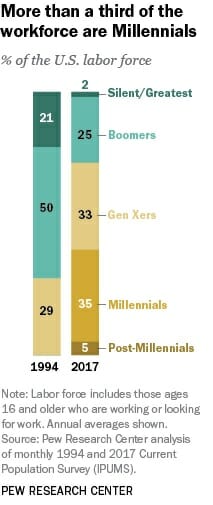Managing generational differences in the workplace is a hot topic in employment and hiring. Research suggesting millennials need more feedback and mentoring has prompted many organizations to overhaul the way they conduct employment reviews and structure compensation conversations.
While the focus is often on millennials, smart hiring managers and recruiters balance the skills and experiences each generation brings to the organization or team, and work to positively encourage and understand the struggles and possible hurdles that may arise.
According to the Pew Research Center, as of 2017, there were 56 million millennials (ages 21 to 36); 53 million Generation Xers, 41 million baby boomers, and 9 million post-millennials (born after 1996) in the workforce.

In 2016, I was asked to be baby boomer representation on a panel for a U.S. Department of State event called, Engaging Every Age: How to Effectively Leverage the Strengths of Each Generation in the Workplace. It was an eye-opening discussion, especially the reactions and comments from the audience.
As the panel discussion continued, it was surprising — considering that millennials are the largest segment of the current workforce — to see how openly hostile baby boomers in the audience were. Some of the complaints from boomers about their millennial coworkers consisted of the following issues they said they experienced:
- Exaggerated sense of entitlement
- Lack of focus
- Poor verbal and written communication skills
In response to comments from the audience, I acknowledged that generational differences do exist in the workplace, but I felt many of the boomers in the audience were unfair, harsh, and intolerant of the younger segment of the workforce. I saw the defensiveness as a lack of understanding and a reaction to perceived threat from their younger co-workers. The hostility, in my opinion, was born out of fear of losing control, and possibly their job, to a younger, less experienced person.
The millennials received low grades on their verbal communication skills, attributed by the members of the audience as a result of their texting habits and inexperience with the art of conversation. Texting in the workplace was a major source of contention with many of the baby boomers present. They expressed irritation with the lack of focus and restlessness seen in their millennial coworkers.
The boomers in the audience expressed especially negative opinions about millennials regarding excessive phone and internet use and lack of attention span as sources of irritation, but the perceived sense of exaggerated entitlement was the most serious issue to boomers.
On the positive side, boomers praised millennials and Gen Xers on their ability to quickly learn and master technology and applications.
Not surprising, the boomers were criticized by their younger coworkers for their attitudes toward workplace change, inability to adapt to new methodology, and struggles with technology and platforms.
The Positives of an Intergenerational Workforce
Gen Xers and millennials have brought positive change to the workforce, including expanded telework programs, more flexible schedules, and leave policies. Baby boomers have benefitted from many changes geared toward younger workers and instead of complaining about cultural norms they find frustrating, they should embrace the positive and beneficial benefits they have encouraged.
As a representative of the boomer generation, I felt a responsibility to defend the millennials and remind my fellow boomers that we were once the young upstarts with new ideas about gender and racial equality, and how each generation in the workplace deserves respect and a chance to prove themselves without judgment and excessive criticism. I remember being the youngest person in my office and feeling my voice didn’t matter.
From the experience of being on that panel, the takeaway was to remember how to show strong and confident leadership to younger members of the workforce and mentor them while giving them autonomy and freedom to work in their own way and space.
In a perfect scenario, coworkers from multiple generations will find a way to work together, being respectful of the strengths and weaknesses each group brings to the team.




